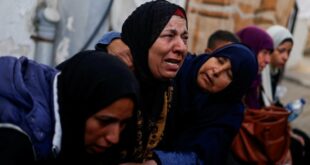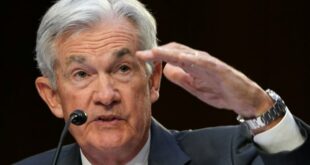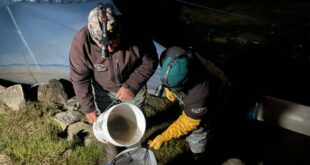Women's voices loom large — both inside and out of a major meeting on church's future

This week in St. Peter's Square, as men in long robes shuffled in solemn processions, with corals and canticles blending with church bells, small groups of Catholic protesters gathered half-a-kilometre away, at the far end of the wide avenue leading up to the Vatican square.
At the end of Via della Conciliazione, or Reconciliation Avenue, ceremonies marked the start of the "synod on synodality" — essentially church-speak for a global summit on the future of the Catholic Church, with an emphasis on listening.
Cardinals, bishops, some clergy and ordinary Catholics from around the world are spending the better part of this month seated across from one another to talk about some of the most pressing issues facing Catholicism and the world — including climate change, LGBTQ inclusion and female leadership.
At the opposite end of the avenue, in the shadow of the massive Castel Sant'Angelo, a fortress where a pope once sought refuge during the sack of Rome, an alternative meeting unfolds. In small, almost-daily gatherings, people hold up black-and-white portraits of sex abuse survivors and unfurl purple banners that read "Ordain Women."
These people will not take part in the Vatican synod, but are rather those who, for years, have been showing up at church summits, doggedly reminding its hierarchy who it has shut out.
An informal coalition of groups is amassing on the sidelines of the synod, which began Wednesday and runs for three weeks, to push for reform in the hopes of bringing the Catholic Church into the 21st century.
"When we go to mass, we never see a woman presiding over it, never a woman preaching, never a woman going in with the College of Cardinals to pick the next pope," said Mary Ellen Chown, a longtime member of Catholic Network for Women's Equality (CNWE), a group that formed in 1981 to advocate for the ordination of women.
Chown, from Oakville, Ont., arrived in Rome this week, along with eight other Canadian women who are part of CNWE.

On Friday, they'll be joining others from around the world for a march on the Vatican to push for opening all ordained ministries to all genders and for a less hierarchical model of the Catholic ministry.
"I think it is in crisis," Chown said of the Catholic Church. "And if it wants to be relevant to the generation of my children, it needs to be a listening church — and that will involve structural change.
"It's not just about female ordination, but the bigger picture of how women participate in the church."

Sensitive issues on the table
Church leaders have hailed this synod as a massive listening session, one that comes after a two-year consultation process with parishioners the world over — about one per cent of Catholics in all taking part and identifying what issues matter to them most.
Those issues were used to set the agenda for this month's meeting, with topics ranging from women in governance, to the rights of LGBTQ Catholics, to priestly celibacy. A total of 365 people hold voting rights, including 54 women for the first time ever — a move that comes after years of campaigning.
"Despite the many filters that were put in place with the final questions put in the hands of ordained men, the issue of women's participation and ordination rang out," said Kate McElwee, executive director of the Women's Ordination Conference, another group rallying outside the synod for gender equity in the Catholic Church.
She points to other positive changes leading up to the synod, such as Pope Francis being open to the idea of female deacons and the Vatican including her group's resources on its website.

That opening up of synod is a change ushered in by Pope Francis.
For the first time, those taking part can have face-to-face conversations with Francis, as he has done since the start of his papacy, encouraging frank conversation.
By contrast, under Pope John Paul II and Benedict XVI, Vatican summits were often staid encounters, held in auditoriums where bishops were expected to parrot set doctrine that had been championed by the pope.
Still, many on the outside of this synod remain skeptical of change, saying the Catholic Church, with its record of tolerating and covering up the sex abuse by priests of children, has minimal credibility in truly listening to what's happening in their parishes and around the world.
Among them is residential school survivor Evelyn Korkmaz, from Fort Albany First Nation in northern Ontario. She's in Rome to push for Francis to mandate the immediate removal of priests suspected of abuse, the firing of bishops guilty of coverups and mandatory reporting of abuse cases to civilian authorities.
"This is the time when you have all the bishops from around the world here in Rome, this is the time to discuss it," she said. "What more could be more important than child sexual abuse?"
Signals of openness
Still, church observers point out that the synod, while not perfect, is the most forward-thinking gathering the Catholic Church has held since the Second Vatican Council the early 1960s, and that Pope Francis is mostly sympathetic to the causes of the protesters and outside observers.
This week, for instance, he made public his response to a letter sent by arch-conservative cardinals in July where they pushed him to clarify his position on a church ban on blessing same-sex unions, which some priests carry out.
The pope wrote he wasn't opposed to same-sex blessings, as long as priests made clear it was not the blessing of a "sacramental marriage" between a man and a woman — the only kind of marriage the Catholic Church officially recognizes.
Even the bishops and cardinals who welcome LGBTQ inclusion and don't oppose female ordination, in theory, say, anonymously at least, that they fear too great a change too fast could risk alienating conservative members of their church.
They worry that could lead to what is a worst fear for many: A schism or the formal separation of the Church into two or more.
And they say that outside a synod in which debate and listening are encouraged is neither the time nor the place for protest.
'When is the right time?'
It's a view that rankles Virginia Saldanha, a theologian from Mumbai and former executive secretary of the Office of Laity & Family of the Asian Catholic Bishops' Forum. She's here with a survivor and advocacy group called Ending Clergy Abuse.
"When is the right time?" said Saldanha. "I don't think Jesus would set foot into the Vatican of today. He would be here listening to these people's stories."
Saldanha has been coming to Rome for a decade now to draw attention to the exclusion of women from the Catholic Church, as well as what she says is the widespread abuse of nuns by priests in her home country.

Despite being a theologian and having worked with bishops, she said she has been shunned by many taking part in the synod. "They're scared of my voice."
But Mary Ellen Chown says she sees the changes in the synod as "an opening."
Iacopo Scaramuzzi, the Vatican observer with the Italian La Repubblica and author of a book on the sex abuse scandal in Italy, The Sex of Angels, agrees.
He says it was no coincidence that Pope Francis released a new encyclical, the highest level of papal document, on the environment on the day the synod opened, and made public his opinion that priests can bless same-sex unions the day before.

Pope warns climate is approaching 'the point of no return'
Featured VideoIn a pastoral letter, Pope Francis is challenging world leaders to commit to binding targets to slow climate change, warning creation is reaching a 'point of no return.' The document was published ahead of a Vatican summit this week and the UN climate talks in November.
"It was a way to tell synodal fathers and mothers that the Catholic Church has to dialogue with society," he said.
"And by no accident, the environmental document is addressed to everyone — not just to Catholic followers, which is another way of saying the Catholic Church has to be open to dialogue with society."
Scaramuzzi says this synod on the future of the Catholic Church may well help the institution gain some credibility in modern society, at a time when fewer and fewer people attend church.
But he doesn't believe the global gathering is likely to draw people back into the pews.
"We're probably entering an era, at least in this part of the world, where the Catholic Church will no longer be a majority. That's not necessarily bad news. If you follow the gospels, Christianity at the time of Jesus Christ wasn't in the majority either."
ABOUT THE AUTHOR

Rome correspondent
Megan Williams has been covering all things Italian, from politics and the Vatican, to food and culture, to the plight of migrants in the Mediterranean, for more than two decades. Based in Rome, Megan has also told stories from other parts of Europe and the world and won many international prizes for her reporting, including a James Beard Award. Her radio documentaries can be heard on Ideas and The Current. Megan is also a regular guest host on CBC national radio shows.

Add some “good” to your morning and evening.
A variety of newsletters you'll love, delivered straight to you.
*****
Credit belongs to : www.cbc.ca
 MaharlikaNews | Canada Leading Online Filipino Newspaper Portal The No. 1 most engaged information website for Filipino – Canadian in Canada. MaharlikaNews.com received almost a quarter a million visitors in 2020.
MaharlikaNews | Canada Leading Online Filipino Newspaper Portal The No. 1 most engaged information website for Filipino – Canadian in Canada. MaharlikaNews.com received almost a quarter a million visitors in 2020.







